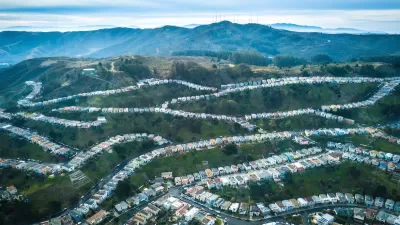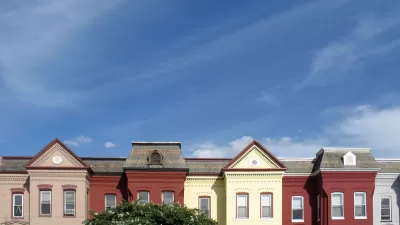The Washington D.C. Zoning Commission is considering a proposal to limit the ability to convert or expand rowhouses. The proposed ordinance has provoked controversy about the effect of the law for the city's supply of housing.
"Sixty-six people have written to the Zoning Commission about a proposal that would substantially limit property owners' ability to expand rowhouses or convert them into condos," reports Aaron Wiener. "The overwhelming majority of the letter-writers, 52 of them, support the proposal. But among the 14 dissenters is an influential voice: the former boss of the office that hatched this plan."
Wiener refers to Harriet Tregoning, now with the U.S. Department of Housing and Urban Development after leading the Washington D.C. Office of Planning under mayors Adrian Fenty and Vince Gray.
During her time as head planner, Tregoning pushed for policy that runs counter to the current proposal. Namely, the current proposal, crafted in response to a proliferation of "pop-ups," "would restrict the addition of extra stories, or pop-ups, on rowhouses in medium-density R-4 zones, and the conversion of these rowhouses to multiple units." The current proposal was released in June, a few months after Tregoning left for the federal government.
According to Wiener, "[the] Office of Planning's Jennifer Steingasser testified last week that the proposal would help preserve affordable housing for families, rather than let it be converted to condos for singles or couples. But Tregoning, in her letter to the Zoning Commission, disagrees."
In Tregoning's own words, as quoted by the article: "I am somewhat puzzled by the proposition that we can increase affordability by decreasing the supply of potential housing units….Restricting the number of units just limits the housing supply in some of the most central and transit- and amenity-supplied neighborhoods of the city."
FULL STORY: The Former Head of D.C.’s Planning Office Opposes the Office’s New Rowhouse Zoning Plan

Depopulation Patterns Get Weird
A recent ranking of “declining” cities heavily features some of the most expensive cities in the country — including New York City and a half-dozen in the San Francisco Bay Area.

California Exodus: Population Drops Below 39 Million
Never mind the 40 million that demographers predicted the Golden State would reach by 2018. The state's population dipped below 39 million to 38.965 million last July, according to Census data released in March, the lowest since 2015.

Pennsylvania Mall Conversion Bill Passes House
If passed, the bill would promote the adaptive reuse of defunct commercial buildings.

Google Maps Introduces New Transit, EV Features
It will now be easier to find electric car charging stations and transit options.

Ohio Lawmakers Propose Incentivizing Housing Production
A proposed bill would take a carrot approach to stimulating housing production through a grant program that would reward cities that implement pro-housing policies.

Chicago Awarded $2M Reconnecting Communities Grant
Community advocates say the city’s plan may not do enough to reverse the negative impacts of a major expressway.
City of Costa Mesa
Licking County
Barrett Planning Group LLC
HUD's Office of Policy Development and Research
Mpact Transit + Community
HUD's Office of Policy Development and Research
City of Universal City TX
ULI Northwest Arkansas
Town of Zionsville
Urban Design for Planners 1: Software Tools
This six-course series explores essential urban design concepts using open source software and equips planners with the tools they need to participate fully in the urban design process.
Planning for Universal Design
Learn the tools for implementing Universal Design in planning regulations.
























